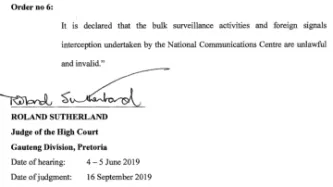
Privacy International's Submission to the Investigatory Powers Commissioner's Consultation on the Consolidated Guidance
Intelligence sharing risks serious human rights abuses. It may also be linked to torture or cruel, inhuman or degrading treatment or punishment. Strong assurances and significant safeguards are required to govern this problematic practice.

In October 2018, Privacy International submitted to the public consultation on the “Consolidated Guidance to Intelligence Officers and Service Personnel on the Detention and Interviewing of Detainees Overseas, and on the Passing and Receipt of Intelligence Relating to Detainees” (“Consolidated Guidance”) held by the Investigatory Powers Commissioner’s Office (“IPCO”).
Privacy International’s submission addresses the portions of the Consolidated Guidance on “the Passing and Receipt of Intelligence Relating to Detainees.” Our work on intelligence sharing has revealed that in most countries around the world, the public remains in the dark regarding arrangements to share intelligence. Moreover, in most countries, those arrangements lack the necessary safeguards to ensure that intelligence sharing does not violate or facilitate the violation of human rights, including the right to be free from torture and cruel, inhuman or degrading treatment or punishment (“CIDT”). The UK is no exception. In a report published this year, the Intelligence and Security Committee (“ISC”) of Parliament documented hundreds of cases where UK officials shared or received information with foreign partners despite knowledge that those partners were committing or likely to commit torture or CIDT.
Our submission proceeds in several parts. First, it provides background on the relationship between intelligence sharing and serious human rights abuses as well as the documented relationship between UK intelligence sharing and such abuses. Second, it discusses why the scope of the Consolidated Guidance is inappropriately narrow with respect to intelligence sharing. Third, it explains why the Consolidated Guidance provides insufficient assistance to UK agencies when considering the human rights implications of intelligence sharing, including its relationship to torture or CIDT. Fourth, it reviews why the “assurance process” as it pertains to intelligence sharing is inadequate. Fifth, and finally, it discusses the need for an establishment of a notification requirement.



